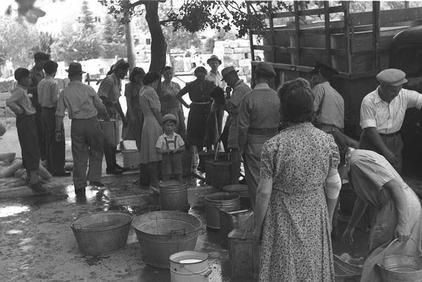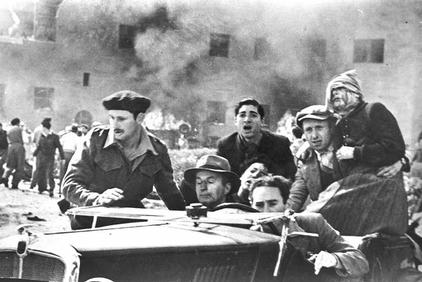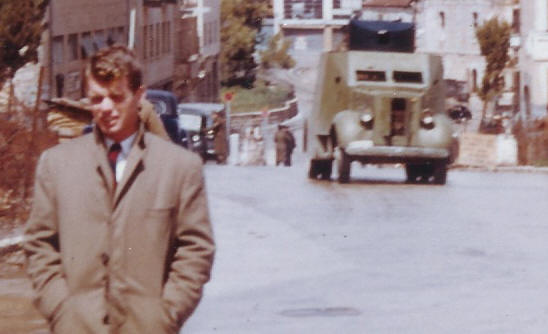I was in Palestine over Easter week and even then people knew there was absolutely no chance to preserve peace. They just wanted the British out, so that a decision could be reached either way. An early departure of the British has been far more important strategically to the Jews than to the Arabs.
The City of Jerusalem has more Jews than Arabs but the immediate surrounding territory is predominately Arab. Through part of that hilly territory winds the narrow road that leads from Tel Aviv to Jerusalem.
It is by this road that the Jewish population within Jerusalem must be supplied, but it is fantastically easy for the Arabs to ambush a convoy as it crawls along the difficult pass. On my trip from Tel Aviv to Jerusalem I saw grim realities of the fact and while in Jerusalem the failure and destruction of another Jewish convoy made meat non-existent and lengthened food queues for other items.
 |
| Jews lining up for water and rations |
Orthodox Community
Within the Old City of Jerusalem there exists a small community of orthodox Jews. They wanted no part of this fight but just wanted to be left alone with their wailing wall. Unfortunately for them, the Arabs are unkindly disposed toward any kind of Jew and their annihilation would now undoubtedly have been a fact had it not been that at the beginning of hostilities the Haganah moved several hundred well-equipped men into their quarter.
This inability to make any long range military maneuvers because of the presence of the British has been a great and almost disastrous handicap to the Jews. If the brief but victorious military engagement on the Tel Aviv-Jerusalem road had not taken place, the Jewish cause would have suffered such a setback as to be virtually lost. If the Haganah had waited for May 15th and the withdrawal of British troops, there would be few alive in Jerusalem today. Strong units of that body had moved into the hills on either side of that strategic road and repelled Arab counterattacks long enough for several hundred truckloads to make the 40-mile trip into the city, and then, only after threats from the British commander to use force against them, had withdrawn from their positions. As a Jew said to me at the time, “This is our battle of the Atlantic.” The maneuvers had to take place and took place despite the British.
Power Supply
The same basic difficulty that exists in relation to the water exists with regard to electric and power supply. Fortunately, an immediate danger is not yet present, but the Arabs have had months of preparations for a maneuver they know their opponents must eventually make.
The Jewish ghetto in the old city of Jerusalem would not have been in such an untenable position if it could have been periodically relieved, or if with a Jewish victory in that area it could have been connected with the main Jewish section in the new city.
The Jews have small settlements or community farms such as Givat Brenner in completely hostile territory. They take pride that, despite the great difficulties, they have not evacuated any of them. From the very tip of Galilee right down to the arid Negev these communities exist with such Jewish names as Zan, Safed, Yehsem, Mishmar Haemak, Ben Sheba, Laza. All have their supply problems. But no great military operation can be undertaken into Arab territory to relieve the increasing Arab pressure.
Need True Facts
In addition to these handicaps that the Jews suffered through the presence of the British, there are many more far-reaching aspects of British administration which unfortunately concern or, rather involve us in the United States.
Having been out of the United States for more than two months at this time of writing, I notice myself more and more conscious of the great heritage and birthright to which we as United States citizens are heirs and which we have the duty to preserve. A force motivating my writing this paper is that I believe we have failed in this duty or are in great jeopardy of doing so. The failure is due chiefly to our inability to get the true facts of the policy in which we are partners in Palestine.
The British government, in its attitude towards the Jewish population in Palestine, has given ample credence to the suspicion that they are firmly against the establishment of a Jewish state in Palestine.
 |
| The bombing of the Jewish Agency |
British Markings
Just before I arrived in Palestine there was the notorious story of the foundry outside of Tel Aviv. It was situated in a highly contested area and the British accused the Jews of using it as a sniper post for the Jaffa-Jerusalem road. One day the British moved in, stripping the Jews of all arms and ordered them to clear out within 10 minutes. The British had scarcely departed when a group of armed Arabs moved in, killing or wounding all the occupants. The British government was most abject in its apologies.
 |
| British checkpoint in Jerusalem |
British Informants
When I was in Tel Aviv the Jews informed the British government that 600 Iraqi troops were going to cross into Palestine from Trans-Jordan by the Allenby Bridge on a certain date and requested the British to take appropriate action to prevent this passage. The troops crossed unmolested. It is impossible for the British to patrol the whole Palestinian border to prevent illegal crossings but such flagrant violations should certainly have led to some sort of action.
Five weeks ago I saw several thousand non-Palestinian Arab troops in Palestine, including many of the famed British-trained and equipped Arab legionnaires of King Abdullah [of Trans-Jordan]. There were also soldiers from Syria, Lebanon, Iraq, Trans-Jordan, and they were all proudly pointed out to me by a spokesman of the Arab higher committee. He warned me against walking too extensively through Arab districts as most of the inhabitants there were now foreign troops. Every Arab to whom I talked spoke of thousands of soldiers massed in the “terrible triangle of Nablus-Tulkarem-Jenin” and of hundreds that were pouring in daily.
Oversubscribed
When I was in Lebanon and asked a dean at the American University at Beirut if many students were leaving for the fight in Palestine he shrugged and said, “Not now – the quota has been oversubscribed.” When journeying by car from Jerusalem to Amman I passed many truckloads of armed Arabs and even then Jericho was alive with Arab troops. There is no question that it was taken over by the Arabs for an armed camp long before May 15.
Our government first decided that justice was on the Jewish side in their desire for a homeland, and then it reversed its decision temporarily. [Editor’s note: In March 1948 the State Department reversed its support for partition and called for a UN trusteeship.]
Because of this action I believe we have burdened ourselves with a great responsibility in our own eyes and in the eyes of the world. We fail to live up to that responsibility if we knowingly support the British government who behind the skirts of their official position attempt to crush a cause with which they are not in accord. If the American people knew the true facts, I am certain a more honest and forthright policy would be substituted for the benefit of all.

